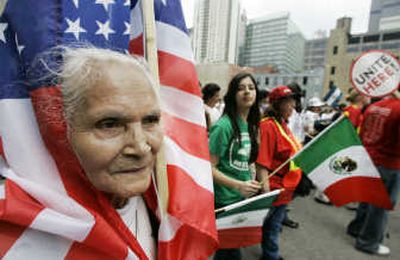A day of law and protest

Enrique Cardiel Ledesma of Guanajuato, Mexico, was first in line for a certificate declaring him a U.S. citizen in a downtown Spokane ceremony Thursday.
Ledesma, 42, entered the United States as an undocumented immigrant and was granted amnesty in the 1980s. A foreman for a Brewster, Wash., orchard, he said he came here to escape poverty. He earned his general equivalency diploma while helping produce the state’s fruit crops.
His English was limited, but there was no misinterpreting his smile, which expressed pure joy upon becoming a U.S. citizen.
He was one of 210 immigrants sworn in as U.S. citizens by federal Magistrate Judge Cynthia Imbrogno at the Masonic Temple as hundreds of friends and family members gathered to watch.
They came from such diverse nations as Bosnia, Taiwan and South Africa.
Also among them was Anderiu Lual, a 25-year-old Whitworth University student from Sudan. The U.S. granted refugee status to Lual in 2000.
As the immigrants gained citizenship in the Law Day ceremony, protesters marked International Workers Day – both fall on May 1 – with marches in cities across the nation calling for immigration reform and workers’ rights. From Spokane to Washington, D.C., and Miami to Los Angeles, activists demanded citizenship opportunities for the estimated 12 million illegal immigrants in the U.S. and an end to raids and deportations.
For the third year, Latino students and supporters in Spokane marched from Riverfront Park to the Thomas S. Foley United States Courthouse a few blocks away. About two dozen demonstrators took part; unlike the first such rally in 2006, they met no counterprotesters along the way.
“We’ve come out to bring awareness to Spokane,” said an Eastern Washington University student and Chicano leader who identified herself only as Criselia. “There are more Latinos here, but they don’t come out.”
The demonstrators called for support of the Dream Act. The legislation, which stalled in Congress last year, would provide legal residency to students who were brought into the county illegally by their parents.
Supporter David Brookbank said U.S. politicians turned their heads while undocumented immigrants entered the country to be exploited as cheap labor, and now it has become politically expedient to demand they be expelled.
Several hundred people marched in Yakima; in recent years thousands have turned out.
The marchers are already U.S. citizens, said Yakima demonstrator Marcos Silva, a fruit-warehouse worker and U.S. resident for 12 years.
“The people who really need the help, they’re not here,” he said.
Several thousand immigration rights demonstrators marched through downtown Seattle on Thursday evening.
In Olympia, anti-war and immigration rights demonstrators broke windows in a pair of downtown banks and left graffiti in some of the marble halls at the domed Legislative Building, the state Capitol. Six people were arrested, and more than two dozen gathered outside City Hall.
In the nation’s capital on Thursday, immigrant rights groups demanded that a Prince William County, Va., law allowing police to investigate citizenship status be rescinded.
In Salem, Ore., about 2,500 people gathered on the steps of the state Capitol to protest a law approved by the Legislature in February requiring proof of legal residency to obtain a driver’s license.